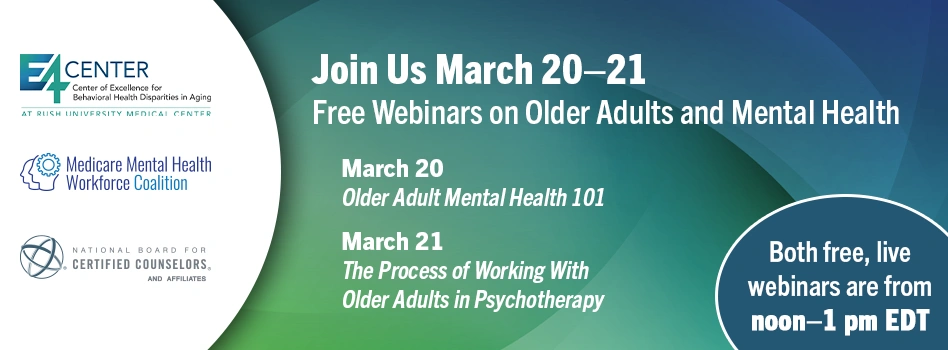
Now that counselors and marriage and family therapists are officially eligible to become Medicare Part B providers, the Medicare Mental Health Workforce Coalition is offering two free webinars for providers on addressing the clinical needs of older adults with mental health conditions. There’s still time to register for either or both webinars, which are being held today and tomorrow in collaboration with the E4 Center of Excellence for Behavioral Health Disparities in Aging, and hosted by NBCC.
The first webinar, Older Adult Mental Health 101, will take place today (Wednesday, March 20) from noon–1 pm EDT, and the second webinar, The Process of Working With Older Adults in Psychotherapy, will take place tomorrow (Thursday, March 21) from noon–1 pm EDT. Participants may register for one or both webinars and can earn up to 2 hours of continuing education credit for attending the live webinars.
The E4 Center of Excellence for Behavioral Health Disparities in Aging works to engage, empower, and educate health care providers and community-based organizations for equity in behavioral health for older adults and their families. E4 achieves this mission through the provision of education; implementation of resources; and technical assistance regarding mental health, substance use, and their intersection with physical health.
March 20—Older Adult Mental Health 101
Though older adults have lower rates of mental health and substance use issues than younger adults, these issues can impact functioning and quality of life more profoundly when coupled with the compounding factors that often accompany the normal aging process. Mental health clinicians need an understanding of the unique ways that these disorders can present in older adults, along with evidence-based assessments and treatments.
After this webinar, attendees will be able to:
- recognize risk factors for mental health problems in older adults.
- identify barriers to diagnosis and treatment.
- characterize unique presentations of mental health disorders in older adults.
- employ evidence-based assessments and treatments.
March 21—The Process of Working With Older Adults in Psychotherapy
Counseling older adults can look a bit different from working with younger adults. Effective management of this process requires an awareness of our own ideas about aging, recognition of what elements of normal aging may impact the therapy process, and strategies to manage these elements.
After this webinar, attendees will be able to:
- identify and challenge systemic and personal stereotypes and promote positive attitudes toward aging.
- recognize elements of normal aging that impact the therapy process.
- implement strategies for working with older adults to facilitate positive outcomes.
Meet Our Presenters
Erin Emery-Tiburcio, PhD, ABPP, is a Professor of psychiatry, behavioral sciences, and geriatric medicine and Director of Geropsychology at Rush University Medical Center. She is also Codirector of the Rush Center for Excellence in Aging; codirector of CATCH-ON, the HRSA-funded Geriatric Workforce Enhancement Program based at Rush University Medical Center; and Codirector of the E4 Center of Excellence for Behavioral Health Disparities in Aging. She is Past Chair of the American Psychological Association Committee on Aging and Past President of the Society for Clinical Geropsychology, and she currently cochairs the APA taskforce to revise the APA Guidelines for Working with Older Adults. Dr. Emery-Tiburcio was recently awarded the 2024 APA Award for Distinguished Professional Contributions to Independent Practice.
Matthew Fullen, PhD, MDiv, LPCC (OH), is an Associate Professor at Virginia Tech, where he teaches in the counselor education program. His research, teaching, and advocacy focus on the mental health needs of older adults with an emphasis on addressing gaps in Medicare mental health policy and developing programs to enhance resilience and wellness and prevent suicide among older adults. Dr. Fullen is the counseling profession’s most active scholar on aging and mental health, with over 40 peer-reviewed publications and over 95 peer-reviewed conference presentations and keynotes. He has received research grant funding from public and private entities, including the U.S. Department of Health & Human Services and the Mather Institute, to develop programs that support older adults’ mental health. More information about his work can be found at agewellcounseling.org.
One hour of continuing education credit is available for attending each live event. Don’t miss out on these informative sessions. Register for one or both free webinars today! If you missed our previous webinars, you can view the recorded sessions here.